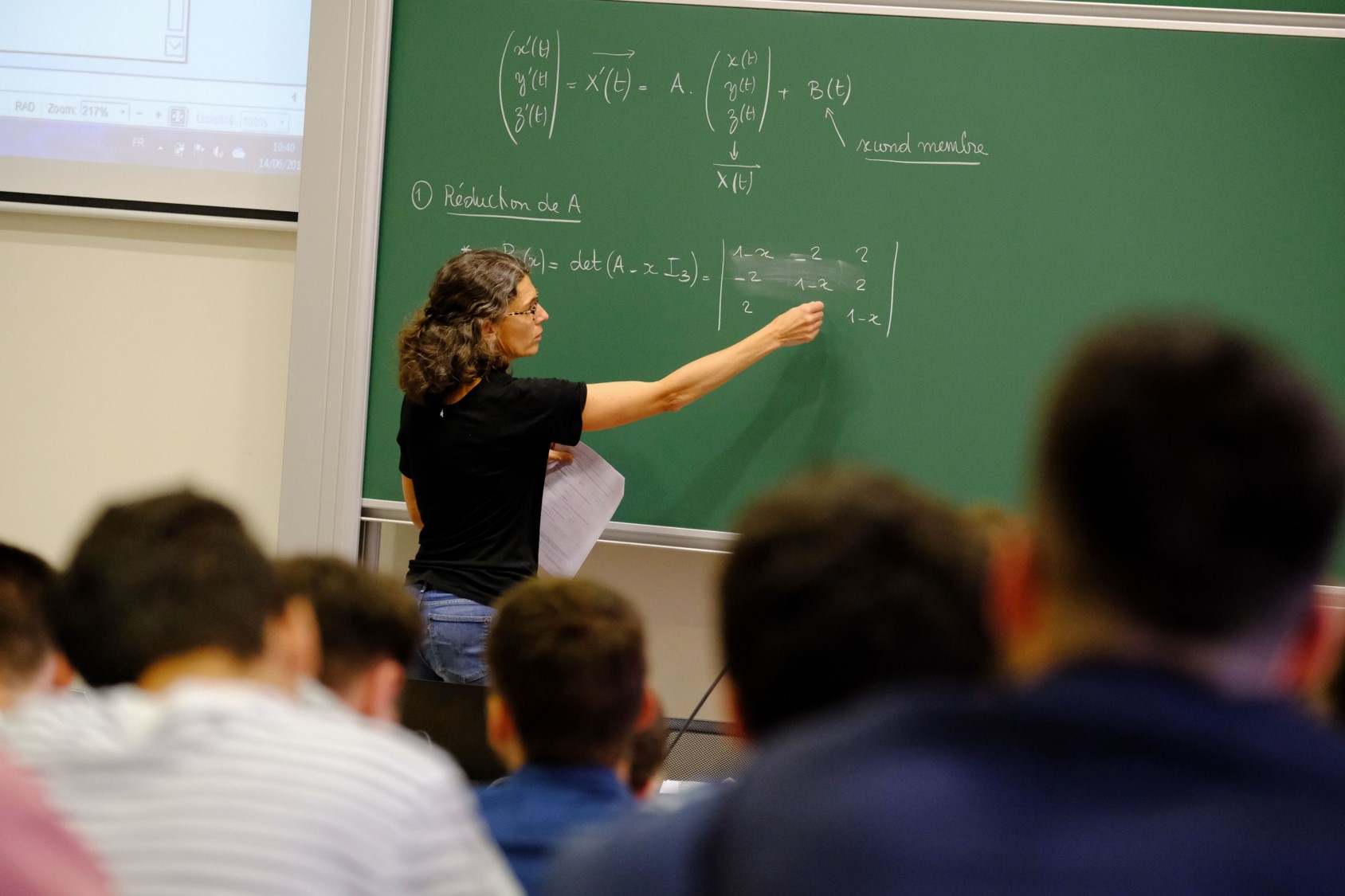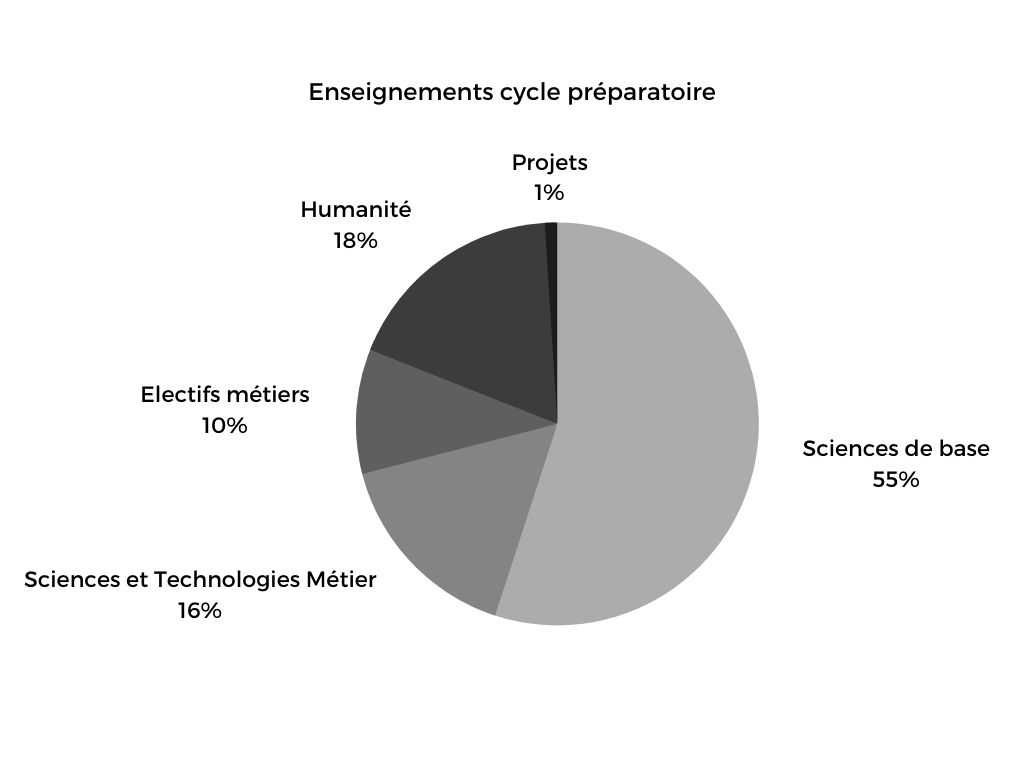The objective of the integrated foundation degree (cycle préparatoire intégré) is to offer a 2-year training course to acquire new skills, new knowledge and the soft skills required by an ENISE specialist engineer. Our engineering students receive basic science training (mathematics and physics), as well as science and technology training in mechanical and civil engineering. Optional subjects start from the first semester. This enables each student to adjust their career objectives by concretely experiencing the available choice of specialties.
Presentation
Each year is organised in 2 semesters of approximately 30 weekly hours of class and project design, organised in course units (UE: Unité d'Enseignement). Each course unit consists in lectures and tutorials - practicals or in smaller groups, with a tutor.

Engineering students move up from one course year to the next by continuous assessment, for all 5 years, without any competitive examination being necessary to enter the Masters degree course.
Students step into the industrial world starting from the foundation degree, with lectures given by professionals, visits to businesses, etc, as well as a compulsory 8 to 12-week internship at the end of the second year.
Our engineering students receive personalised follow-up and one-to-one mentoring from their teachers. During the foundation degree, each engineering student has their own advisor.

-
1st year
Semester 1
Mathematics & IT CU (Course Unit) (7 ECTS)
- General mathematics
- General IT
Physics Chemistry and Materials CU (7 ECTS)
- Mechanics – Non-deformable Solid Mechanics
- Physics- General Physics
- Chemistry of materials
Languages CU (4 ECTS)
Humanities and Social Management CU (1 ECTS)Personal development CU (2 ECTS)
Mechanical Systems Design Mechanical Engineering CU (1 ECTS)
- Analysis and modelling of mechanisms
Production Industrialisation Mechanical Engineering CU (2 ECTS)
- Manufacturing processes
Floor Infrastructures Environment Civil Engineering CU (1 ECTS)
- Granular material
Structures and Envelopes Civil Engineering CU (1 ECTS)
- Building heating
Methods Organisation and Technologies Civil Engineering CU (1 ECTS)
Optional subjects CU (3 ETCS)
-
Semester 2
IT & mathematics CU (7 ECTS)
Physics Chemistry and Materials CU (7 ECTS)
- Resistance of materials mechanics
- Physics - General Physics
- Physics – Electronics Electromagnetism
- Chemistry Materials Materials science
Languages CU (3 ECTS)
Humanities and Social Management CU (2 ECTS)
Personal development CU (2 ECTS)
Mechanical Systems Design Mechanical Engineering CU (1 ECTS)
- Study and technological implementation of connections/liaisons
Production Industrialisation Mechanical Engineering CU (2 ECTS)
- Principles of Metrology
Floor Infrastructures and Environment Civil Enhineering CU (1 ECTS)
- Floor characterisation
Structures and Envelopes Civil Engineering CU (1 ECTS)
- Building acoustics
UE GC Methods Planning et TechnologiesCivil Engineering CU (1 ECTS)
- Public works: technology and planning
UE Electifs (3 ECTS)
-
2nd year
Semester 3
Computational Mathematics CU (Course Unit) (6 ECTS)
- General mathematics
- Databases
Physics/Chemistry of Materials CU (6 ECTS)
- Mechanics - Resistance of materials
- Physics – Electronics & Electromagnetism
- Chemistry of Materials – Chemistry
Languages CU (3 ECTS)
Humanities and Social Science for Management CU (2 ECTS)
Sustainable development CU (2 ECTS)
Design of Mechanical Systems - Mechanical Engineering CU (1 ECTS)
- Sequential system: description & representations
Production & Industrialisation - Mechanical Engineering CU (2 ECTS)
- Industrialisation
Floors, Infrastructures & Environment - Civil Engineering CU (1 ECTS)
- Floor classification
Structures and Envelopes - Civil Engineering CU (1 ECTS)
- Composite materials
Methods, Organisation and Technologies - Civil Engineering CU (1 ECTS)
- Typology of structural works
Optional subjects CU (3 ECTS)
Project CU (2 ECTS)
-
Semester 4
Computational Mathematics CU (Course Unit) (5 ECTS)
- General mathematics
- Databases
Physics/Chemistry of Materials CU (9 ECTS)
- Mechanics of Non-deformable Solids
- Mechanics – Resistance of Materials
- Physics – Theory of automatic systems
- Chemistry of Materials - Chemistry
- Chemistry of Materials - Materials Science
Humanities and Social Science for Management CU (1 ECTS)
Internship CU (10 ECTS)Floors, Infrastructures & Environment - Civil Engineering CU (1 ECTS)
- Floor hydraulics
Structures and Envelopes - Civil Engineering CU (1 ECTS)
- Reinforced concrete
Methods, Organisation and Technologies - Civil Engineering CU (1 ECTS)
- Study of simple constructions with all trades involved
Optional subjects CU (2 ECTS)
